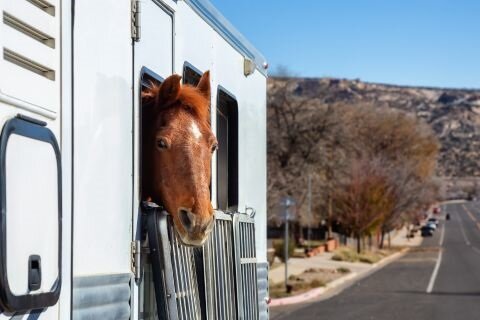
For horse enthusiasts, venturing out to competitions, trail rides, or even a change of scenery can be an exciting adventure – for both you and your equine companion. But ensuring a safe and comfortable journey for your horse requires careful planning and preparation. Here’s a comprehensive guide packed with helpful tips to make traveling with your horse a positive experience.
Know Your Horse
There are all sorts of different horse breeds, and each animal has its own personality. Understanding the individual needs of your trailering horses will ensure they’re happy and comfortable during the ride. Whether your horse is social, aloof, or fearful of new experiences will have a huge impact on your overall trip. By getting to know your horse beforehand, you can make things go much smoother.
Before You Trailer
- Get Documented: Always check the health certificate requirements for your destination. A current health certificate from your veterinarian is often necessary, and some states may have additional requirements.
- Horse Health Check: Schedule a pre-travel vet check to ensure your horse is fit for travel. Discuss any potential health concerns and get recommendations for managing them during the trip.
- Practice Makes Perfect: If your horse isn’t familiar with trailers, gradually introduce them to the environment. Allow them to explore the trailer, get used to being loaded and unloaded, and practice standing quietly while it’s stationary.
- Pack Smart: Prepare a well-stocked first-aid kit for your horse, including essentials like bandages, antiseptic wipes, and any medications they may require. Don’t forget extra hay nets, water buckets, and halters.
Planning Your Route
- Map It Out: Choose smooth, well-maintained roads whenever possible. Avoid busy highways and construction zones that could create a stressful environment for your horse. Factor in rest stops and consider overnight stays for long journeys (every 12 hours is ideal).
- Be Time Aware: Plan your travel time realistically, accounting for breaks, potential traffic delays, and the added time it takes to drive with a trailer.
- Know Your Limits: Don’t push your horse or yourself too far. Be prepared to adjust your schedule based on your horse’s well-being.
Trailer Essentials
- Safety First: Do a thorough check of your trailer before each trip. Ensure all lights are functional, brakes are working properly, and tires are properly inflated.
- Creature Comforts: Provide ample hay for your horse to munch on throughout the journey. Hay nets hung low will reduce waste and encourage continuous nibbling of low-sugar hay for horses. A secure water bucket is essential, and some horses benefit from electrolytes during long hauls (consult your veterinarian). Consider using well-fitting shipping boots to protect your horse’s legs.
- Bedding Matters: Choose a comfortable, non-dusty bedding material like shavings or shredded paper. Deep bedding can help prevent slips and falls.
- Hydration is Key: Horses can easily become dehydrated during travel. Plan to offer water breaks every 2-4 hours, more frequently in hot weather.
- Move It or Lose It: Long periods of standing can be uncomfortable for horses. If possible, unload your horse at rest stops to allow them to move around and stretch their legs (be sure to choose a safe and appropriate area).
- Drive with Care: Maintain a smooth and steady pace. Avoid sudden stops, sharp turns, and unnecessary acceleration. Be mindful of your increased stopping distance due to the weight of the trailer.
Additional Tips
- Calming Techniques: Some horses travel better with calming herbs or supplements. Discuss this option with your veterinarian beforehand.
- Weather Watch: Be prepared for changing weather conditions. Pack a rain sheet or cooler for hot weather, and ensure proper ventilation during transport.
- Patience is a Virtue: Horses are individuals, and some may adjust to travel more easily than others. Remain patient, offer words of encouragement, and focus on creating a positive experience for your horse.
Trailering horses long distance doesn’t have to be a burden for you or your animals. By following these helpful tips and prioritizing your horse’s well-being, you can ensure a safe and enjoyable journey for both of you. Remember, a well-planned and comfortable trip sets the stage for a successful and rewarding adventure with your equine companion.




